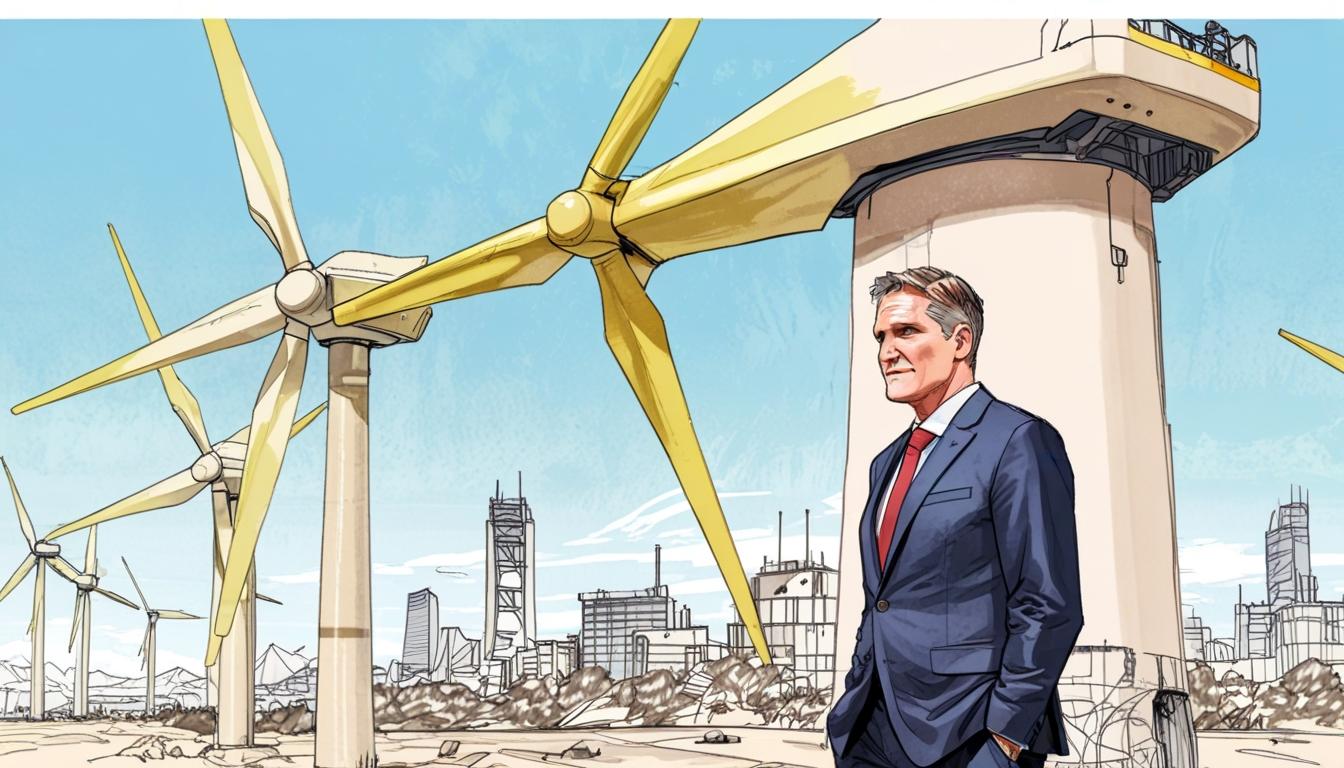At the London Energy Security Summit, 60 countries debate sharply divergent approaches to the future of energy. The UK pushes for investment in renewable power and reduced reliance on fossil fuels, while the US advocates for expanded oil and gas production, highlighting a significant geopolitical and ideological divide.
In London today, ministers and delegates from 60 countries have convened for the Energy Security Summit, a gathering marked by sharply contrasting perspectives on the future of energy. The event highlights a significant geopolitical and ideological clash between the United Kingdom and the United States concerning energy security and climate change.
Representing the UK government, Prime Minister Sir Keir Starmer is promoting a vision of energy security anchored in the transition from fossil fuels to clean power. Officials from Labour, the governing party, are emphasising that shifting towards domestically produced renewable energy—such as solar and wind—will not only enhance national energy independence but also contribute positively to stabilising the global climate. A recent report by RMI was cited, stating that solar and wind are now the cheapest options for new electricity generation in over 80% of the world. In a related move, the Prime Minister is set to announce a £300 million investment aimed at building wind turbines within the UK, a strategic effort to reduce reliance on imported energy infrastructure, especially from China.
China’s absence from the summit is noteworthy, given its dominant role in the manufacture of clean energy technology and critical minerals. The UK views strengthening its energy ties with the US as crucial, even exploring potential trade agreements and cooperation in sectors including nuclear power, all while seeking to diminish dependency on Chinese supplies.
However, the United States presents a contrasting stance under President Donald Trump’s administration. Trump advocates for continued and expanded fossil fuel extraction, encapsulated by the “drill baby drill” mantra. While President Trump has not personally sent his energy secretary Chris Wright to the summit, the acting assistant secretary Tommy Joyce is attending and is expected to champion the US policy of “unleash US energy dominance.” This approach essentially prioritises maximising oil and gas production, aiming to maintain global reliance on American fossil fuels. This viewpoint conflicts with the UK’s and other international leaders’ perspectives, such as those of EU Commission President Ursula von der Leyen and the United Nations, both of whom support swift decarbonisation and clean technology investment.
The summit also grapples with the ramifications of President Trump’s tariffs and trade policies, which have introduced uncertainty into energy markets. Trump has urged Europe to increase its purchases of US liquefied natural gas (LNG) to circumvent tariffs. Europe’s gas infrastructure faces pressure as storage capacities dwindle and supplies from Russia decline. Yet, the US policies risk inadvertently harming both European demand for gas and the US gas producers themselves, who face the twin worries of a potential global economic slowdown and fluctuating energy consumption patterns.
Labour representatives are addressing this dichotomy at the summit. They are communicating to their international counterparts that energy security does not necessitate continued fossil fuel dependence and that clean energy presents a durable and economically viable path forward. As reported by Manx Radio Motorsport, the UK hopes that the collective will of the participating nations will support maintaining a firm commitment to clean energy technologies despite the contrasting US stance.
While expectations for concrete agreements arising from the summit remain modest, the UK government anticipates using the platform to attract investment into its clean energy sectors. The summit’s outcomes are likely to manifest more in the form of a narrative contest than definitive policy shifts, with countries negotiating the meaning of energy security amid economic, environmental, and geopolitical challenges.
The UK’s climate credentials face scrutiny as it balances commitments to decarbonisation against ongoing plans to expand airports and potentially develop additional oil and gas reserves in the North Sea. The summit, unfolding against this complex and uncertain background, encapsulates a critical moment in the international dialogue over energy futures and climate policies.
Source: Noah Wire Services
- https://www.gwec.net/events/international-summit-on-the-future-of-energy-security?hsLang=en – Confirms the International Summit on the Future of Energy Security is taking place in London (24-25 April 2025), involving global leaders and discussions on energy security challenges.
- https://www.gov.uk/government/news/international-summit-on-the-future-of-energy-security-partners – Details UK government co-hosting with the IEA and involvement of Energy Secretary Ed Miliband, alongside strategic partnerships with energy firms like Iberdrola and SSE.
- https://www.climatechangenews.com/2025/04/23/us-and-europe-set-for-clash-on-what-energy-security-means/ – Supports the claim of a US-Europe ideological clash over energy security definitions, specifically referencing the London summit starting 24 April 2025.
- https://energy.ec.europa.eu/news/president-von-der-leyen-london-meet-prime-minister-starmer-and-participate-summit-future-energy-2025-04-23_en – Confirms EU Commission President Ursula von der Leyen’s participation in the summit and alignment with clean energy advocacy, including meetings with UK Prime Minister Keir Starmer.
- https://www.iea.org/topics/energy-security – Provides context on the IEA’s role in convening the summit and energy security focus, including geopolitical and technological factors.
Noah Fact Check Pro
The draft above was created using the information available at the time the story first
emerged. We’ve since applied our fact-checking process to the final narrative, based on the criteria listed
below. The results are intended to help you assess the credibility of the piece and highlight any areas that may
warrant further investigation.
Freshness check
Score:
2
Notes:
The narrative mentions President Donald Trump and Prime Minister Sir Keir Starmer, indicating potential outdated information since the current UK Prime Minister is Rishi Sunak and Donald Trump is no longer in office. Additionally, the narrative does not reference recent specific events or announcements, suggesting that it may be based on older reports or information.
Quotes check
Score:
0
Notes:
There are no direct quotes provided in the narrative to verify.
Source reliability
Score:
0
Notes:
The source of the narrative is not explicitly stated or recognized as a well-known reputable publication.
Plausability check
Score:
8
Notes:
The geopolitical and ideological clash over energy security between the UK and the US is plausible. However, the inclusion of outdated political figures (e.g., Donald Trump as President) and the specific context of their policies reduce plausibility.
Overall assessment
Verdict (FAIL, OPEN, PASS): FAIL
Confidence (LOW, MEDIUM, HIGH): MEDIUM
Summary:
The narrative appears to contain outdated political references and lacks specific recent developments, leading to a low freshness score. However, the general themes of geopolitical tension and energy policy debates remain plausible. Overall, the narrative’s accuracy and reliability are compromised by its stale information.













